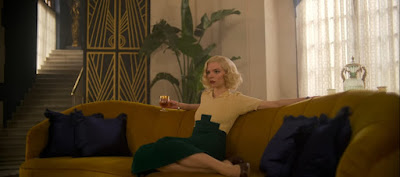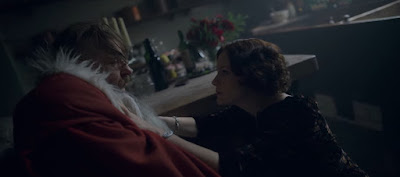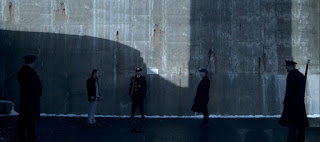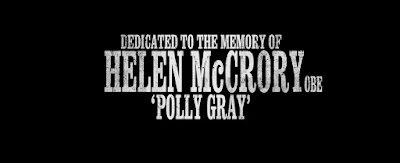I have excellent news: the sixth and final season of Peaky Blinders (movie pending) went above and beyond my expectations. I'd hoped it would, at best, justify some of the choices made in the last season. Instead, it confronted those choices head-on, achieving a level of domestic, familial intimacy that I never expected and absolutely loved.
But we'll take it one episode at a time.
Four Years Ago:
Season Five left us with a cliffhanger: Tommy, completely lost, wandering into the fog with a gun to his head. In the opening scene, Tommy tries to shoot himself. He fails. Arthur had taken the bullets out, and Lizzie knew what Tommy was going to attempt. His family saved him.
But Tommy saw it through the Roma mysticism that he began to embrace last season, speaking to his late mother: "They wouldn't let me pass." Tommy is longing for his "soldier's moment"—the respite from death he's been living in since WWI—to finally end. And the world didn't give that to him.
 |
| I am not the first person to make a Two-Face joke here. |
It did give him a new mission: to avenge the deaths of Aberama, Barney the sniper, and Aunt Polly at the hands of the fascist wing of the IRA, under the direction of Captain Swing, whom we met last season. (She was part of the team that captured Michael on his way back to Birmingham.)
Who's to blame here? Last season, the singer, Billy, called someone to rat out Tommy's plan to assassinate Mosley. But Michael and Gina also had a Plan B, and Michael has interacted with Swing before. In this episode, Michael blames Tommy for Polly’s death, saying "It was the ambitious and strategies of one man that caused this...I swear to Almighty God that I will take revenge on Tommy Shelby," but maybe Michael, as always, doesn't have the full story.
I'd wondered how Steven Knight would deal with the real-life death of actress Helen McCrory, and this choice was both tasteful and heartbreaking. It allowed us, the viewers, to mourn with her castmates. It's no spoiler, I think, if I say that Aunt Polly's death haunts this entire season, which is quite death-haunted in general.
The wordless shots of each person at Polly's funeral, each of them alone in in a close frame, was a beautiful tribute to a woman who was, by all accounts, a truly wonderful human being.
Now: 1933. In Canada. For Some Reason.
Alternate Subtitle One: Steven Knight Does a Western.
Alternate Subtitle Two: Welcome to the Bar Where Nobody Knows Your Name, Even If Your Name is Tommy Shelby.
Alternate Subtitle Three: What Was that Reality Show Where the Bosses Went Behind the Scenes of the Company They Owned? "Undercover Boss"?
Tommy has quit drinking. The "voices" are quieter (hooray...?). He's still insanely violent, perhaps more so than usual, since nobody knows who he is. He's got some William Blake poetry memorized, which may fit into the way Tommy has visions/hallucinations, which Blake was known for.
Michael is fully allied with the Americans. If you can't tell by his words, the broad brim of his hat and his Villain Mustache make it clear.
 |
| Nice 'stache, bro. Cool hat. |
Prohibition is over, and the black-market trade in booze is drying up. Michael's new buddies want to work with Tommy. Those buddies are Boston Irish, which is a bit surprising, since Gina mentioned being from Long Island last season. Their last name is not Kennedy (it's Nelson), but they are obviously the Kennedys, right? And "Jack Nelson" is obviously Joe Kennedy, the former bootlegger whose past has been "forgotten"?
It's been so long since I first binged Peaky Blinders that I'd forgotten the joy that this show's twists and turns could create. The tension in the bar scene was lovely. I had no idea what was happening or who would wind up maimed. The violence was so gloomy and ugly, too, as much of the violence will be throughout the season.
(This scene, which is broken up to avoid tedium, also had a shocking amount of expository dialogue. Tommy is working with the Belfast Irish and wants to make a deal with the Boston Irish, including Michael, who Tommy has set up for trouble when he gets back to the US. I think that's what we need to know.)
Back in the USA:
I don't have a lot to say about Michael and Gina here: Michael's in prison, Tommy played a trick on the Nelsons, Gina is deeply unsympathetic, and her apartment is so beautiful and so different from any of the other interiors we've ever seen on the show:
 |
| This is just so bright and pretty. |
This scene, like the Newfoundland scene, also has lots of exposition: Tommy is willing to start a gangster war among the Irish, Italian, and Jewish crime families in Boston. Tommy reveals information, likely to conceal other information. It's a delightful scene–two excellent actors acing every moment.
Meanwhile, A Birmingham Christmas: A Time for Family:
Poor Arthur. At his best, Arthur would be an ideal Santa Claus: if Tommy creates and demands loyalty, Arthur generates enthusiasm. But Shelby family holidays never quite work, do they? Tommy's failed attempt at a Christmas dinner back in Season Four, his wedding, etc, etc. Here, amidst Johnny Dogs's screaming kids, it's even more of a disaster than usual due to Arthur's newest addiction, opium.
 |
| Bad Santa. |
This episode intercuts scenes Arthur's drug-fueled depression with Tommy brokering opium deals, which echoes Tommy's disregard for Arthur last season, even when Arthur was asking him for help (not to mention Arthur telling him that getting into the opium business was a bad idea).
And poor Ada, who feels like there's a "leak without a bucket." She's still the CEO of emotional labor at Shelby Co, Ltd., but she's also aware of Polly's absence. Ada doesn't know how to get Arthur sober, and she thinks Polly would have known. All she can do is rely on the Shelby family name, written in lipstick on his chest, to get people to stop selling him opium. (I loved Arthur's mumbled "I love you, Ada" line as he conked out in the kitchen. I love you, too, Ada.)
And poor Lizzie, tied to a man who has become a robot in the wake of Polly's death. As much as this is a show about family—something this season finally, really addresses—Lizzie is the only person who seems to realize that families require work to happen effectively: it's no coincidence, I think, that the first we hear of Lizzie, back in Season One, is not just that she was a prostitute but also that she was a wonderful custodian of John's children.
Lizzie is an idealized mom, in the messy idealism of this show. But just as this episode intercuts scenes of Arthur doped up on opium with Tommy doing opium deals, it juxtaposes Lizzie and Tommy talking about Ruby (who is sick) with a prostitute leaving Tommy's Boston hotel room.
As "robotic" as Lizzie claims Tommy has been, their conversation has an intimacy that we rarely see in this show, as when Tommy admitted his just wanted to give Ruby a hug. So many of Lizzie and Tommy's interactions are a mixture of pragmatism and antagonism—as this one becomes—that this brief respite, even with the prostitute in the background, is quite lovely.
Of course, nothing beautiful happens on this show without an impending disaster. Tommy, relatively unworried about Ruby's fever, becomes irate when Lizzie tells him that Ruby is also speaking some Romany words (none of which Netflix translated for me). Tommy seems to think Ruby has a gypsy curse. I hope that is not true.
Overall Thoughts:
Many years ago, Emily Nussbaum, the TV critic for the New Yorker, coined the term "bad fan" to describe viewers who watched Breaking Bad and rooted wholeheartedly for Walter White. I thought of her ideas here in Gina's conversation with Tommy, when she (Gina, not Emily Nussbaum) says that, in England, Tommy evokes two sentiments: "Oh, the horror," and "Oh, the desire."
This is a beautiful distillation of the appeal of this show for a certain subset of viewers who watch this show and want to be a Peaky Blinder, with the vest and the flat caps and the haircut and the desire for manly, vicious power. For that type of viewer, "horror" and "desire" are the only options. Those viewers don't want to feel horror (perhaps because it would be unmanly) and therefore want to place themselves in the position of being desired, which they think must be linked to evoking horror in others. It's fascistic, it's mistaking power for virtue, it's causing problems across the world today.
That tension–between the show's glamorous portrayal of violent masculinity and what I hoped, sometimes rather hopelessly, was its ultimately heartfelt and not-awful message–is part of what I struggled with so much in Season Five.
In this season, Tommy is still a glamorously beautiful gangster, but this episode shows the cracks in that façade, especially in the conversation with Lizzie and the brutal, unpretty violence of the bar scene. Arthur’s own struggles, which are about as unglamorous as can be, reveal just how damaging—to oneself and others—a life like this can be. We’ll start to see Steven Knight exploring those cracks, teasing them into fractures, over the next few episodes.
Distilled for the Eradication of Seemingly Incurable Sadness:
• I thought the Newfoundlanders, or "Newfies" as I believe they're called, were supposed to be the friendliest Canadians! Perhaps these Newfies are angry at still being under the thumb of the French.
• At first, I'd thought the little black dog that followed Tommy through the Canadian village was going to be a plot point. Then, I thought it was symbolism (black dog of death, etc). Now, I've decided to believe it was just a puppy who wandered onto set and took a shine to Cillian Murphy.
• As much as I love this season–and I really, really do–there are some odd directorial choices in each episode. In this one, the pigeon flying through the unfriendly Newfie bar felt like an evocation of John Woo's films. But I have absolutely no idea what that means.
• Do you think Cillian Murphy has a portrait in his attic that ages appropriately? I know Billie made this joke somewhere but I can't remember where.
Josie Kafka is a full-time cat servant and part-time rogue demon hunter. (What's a rogue demon?)



Josie, I love your reviews.
ReplyDeleteI hate that we're getting this last season without Polly (RIP, Helen McCrory), but they wrote her out well. And clearly, Tommy hasn't been able to get over her loss.
That opening suicide scene with the fog and Tommy's face in the mud was just stunning. In fact, I kept noticing that every scene in the episode had mist, smoke, fog, cigarette smoke, opium smoke, or obscured lighting. Right up until the near blinding bright sunlight in Gina's house. I wonder what that meant? Had to mean something. Is Gina the answer to Tommy's emotional fog?
Poor Arthur. Speaking of fog...
I honestly don't remember making the Dorian Gray comment, but that's something I would do. :)
Thanks for beginning to review the new season! I read your last season reviews but couldn't remember it clearly enough to comment...I'm more up to speed now!
DeleteI found the "Newfoundland" description of the location confusing since as far as I know Saint-Pierre et Miquelon have never been thought of as part of Newfoundland. Maybe they didn't think audiences outside Canada would have any clue where Miquelon was? Also, I think Newfoundlander is more accepted than Newfie which is associated with derogatory jokes.
I thought the way Michael phrased his statement about Polly's death resulting from the "ambitions and strategies" of Tommy almost identically to the note he received from the IRA. Which I interpreted as a dead giveaway as to who ratted them out.
One thing I found very interesting about this season in general is the central role of gypsy mysticism. That was a striking feature of the very first episode, but much less noticeable through much of the rest of the series.
Billie, yes! This season is even smokier and foggier than usual, except for Gina's lovely apartment.
ReplyDeleteIt's an interesting contrast, too. Tommy decorated his absurdly large house to mimic a country manor. Gina decorates her absurdly beautiful apartment in the latest fashions. American money that's been established for one generation vs. brand-new British money.
Magritte, thank you! I remember reading or watching something once in which a Newfoundlander used the term "Newfie" to describe herself, so it must be the kind of thing that Newfoundlanders can say and the rest of us can't. (I know so little about Newfoundland that I didn't even know that there were any derogatory jokes associated with it.)
And, yes: I suspect the show was trying to give us a sense of where we were. I wonder if they originally went for a more twenty-first century title card, like "It's in the upper part of eastern Canada, just go with it" but decided that didn't fit the show's vibe.
I'll review these episodes as quickly as I can. I struggle with reviewing this show because I love it so much, but there's also so very much to say!